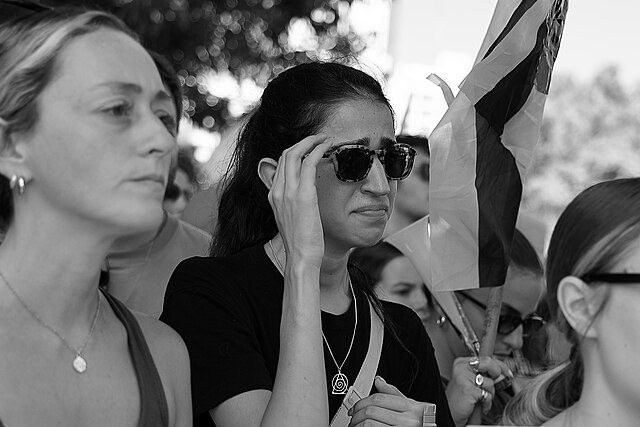
Photo Credit: September 2024 Protest in Tel Aviv - Begin Bridge by ליזי שאנן , Wikicommons
Even if you haven’t been paying close attention to the news, October 7th should still stand out as a day to pause and reflect.
It has been one year since the Hamas attack on the Kibbutzim in Israel and the escalation to a new level of offensive on the Palestinian people. October 7th, similar to September 11th, will now likely be marked annually to solemnly remember the deaths and hostages taken in the attack on Israelis. But unlike after September 11th, for many around the world, it will also solemnly mark the death and destruction of many Palestinians.
This is the continuation of a long conflict but observers have pointed out that this time some things are different.
One distinction has been Benjamin Netanyahu’s and the Likud Party’s shocking escalation and relentlessness in their policies and actions. They have responded to the very real threats to their state with a strategy of brutal elimination, doubling down on their past tactics of invasion, control, violence and intimidation. In January 2024, Netanyahu stated at a press conference: “In any future arrangement … Israel needs security control over all territory west of the Jordan River,” he said. “This collides with the idea of [Palestinian] sovereignty. What can you do?”
Two months later, the UN Human Rights Council listened as Francesca Albanese, Special Rapporteur on the situation of human rights in the Palestinian Territory occupied since 1967, said,
“Following nearly six months of unrelenting Israeli assault on occupied Gaza, it is my solemn duty to report on the worst of what humanity is capable of, and to present my findings. … There are reasonable grounds to believe that the threshold indicating the commission of the crime of genocide … has been met.”
Since this report, despite international pressure for the protection of Palestinians from genocide and war crimes, Israel continues to escalate attacks in Gaza, the West Bank, and Lebanon.
There is an awakening happening among individuals and among nations, and across the globe.
There is also much more vocal disagreement among Israelis. Al Jazeera has produced detailed reporting that maps the rise of protests in Israel. For example, on September 8th, an estimated 750,000 Israelis took to the streets in Tel Aviv to call for a ceasefire to secure the return of hostages. Some Israelis are also calling for an early election because of Netanyahu’s handling of the Gaza war. And on a recent episode of the popular US radio program This American Life, host Ira Glass said, “I have an Israeli friend who said to me that this war is different from ones in the past in Israel, because in the past, he said, once the war started, everyone united.”
Angela Davis and Dr. Gabor Maté, on a June 2024 Sounds of Sand podcast, reflected on the decades-long global struggle for Palestinian freedom. They remarked that there has been a shift towards more awareness and willingness to speak out, something they thought they might never see. While many want her to go further, it is significant that U.S. Vice President and Presidential Candidate Kamala Harris spoke of the devastation of Gaza in her nomination acceptance speech. This public signal to Israel is a big change from American administrations of the past who sided with Israel, for the most part, unquestioningly. Some parts of the media have openly begun to examine their biases and have improved their coverage.
I am interpreting these developments as indicators of promising change in our collective ability to grapple with the complexity of managing conflict and resisting violence and oppression. The level of horrific, devastating violence and the blatant disregard for humanity is forcing us, as a globalized society, to become more nuanced in our understanding of history, where we are today, and potential solutions going forward.
There are some important questions that lie ahead. Has the American administration learned from its blundering perpetual wars in the Middle East and can it play a more effective role in the support of peace? What is the role of the UN and how does it enforce accountability among nations? How do we not just stop genocides once they have begun, how do we prevent genocides from happening in the first place? Roméo Dallaire, retired lieutenant-general in the Canadian Armed Forces, has been asking this question for years. It has me paying special attention to reports of how one perceives ‘the Other’ – is it with humanity, or is it sliding into tribalism and dehumanization?
Personally, as I look ahead, I hope we are maturing in our ability to have conversations about the Israeli-Palestinian conflict. I’ve heard from many people about how difficult it was in this past year, as we felt forced to choose a side, or felt silenced from our lack of understanding. I hope we have learned that it is possible to hold a high level of caring for everyone suffering through this conflict. I hope we have learned to listen to more voices and perspectives to get a more sophisticated understanding. And I hope that there are more people awakened to the fragility of human life and the need to reduce ignorance, waste, suffering, and injustice.
To mark October 7th, I pulled up some quotes from the “The Human Venture & Pioneer Leadership Journey Reference Maps” to remind myself that progress is not inevitable; it requires commitment and persistence from many. It can feel slow and disorganized.
Here are a few quotes that spoke to me:
Human progress never rolls on wheels of inevitability. It comes through the tireless effort and persistent work of men willing to be co-workers with God, and without this hard work, time itself becomes an ally of the forces of social stagnation.
– Martin Luther King. Jr. (1929-1968). “Letters from Birmingham City Jail,” 16 April 1963
Periods of confused anarchy… seem always destined to precede the birth of a new society.
– Gustav Le Bon (1841-1931). Introduction to The Crowd: A Study of the Popular Mind, 1895, Viking Press edition, 1960
In order that progress be realized, perhaps it is necessary that all evil alternatives be exhausted.
– Louis Blanc (1811-1882)
This last quote leaves me with a chill. It feels like an enormous waste to go through even more suffering to get to a better place. These emotions are important. They signal that there is something meaningful to pay attention to. Learning about this conflict can be intimidating, but it is possible. There are many threads into it. Following one thread leads to more, and then more, and, with time and a thoughtful approach, you begin to develop a more sophisticated tapestry of understanding.
One year ago, I began my journey to learn about the intertwined histories of Palestine and Israel. An area of the world I knew little about, I have spent hours reading, watching news and documentaries, hearing from Palestinians and Israelis, and grappling with the grief and despair of being a witness to such suffering.
Although I still feel like a novice, part of learning is a responsibility to share what one has learned as best as one can, so that others can continue to build on it.
I hope that this annotated bibliography I have developed over the past year will be useful to you in your own learning journey about Palestine and Israel, and about the discipline of Human Learning Ecology.
Dana Penrice is a Human Venture Associate and Co-Chair of the Human Venture Institute. She is the managing director at Holistic Management Canada and works as a consultant to develop thoughtful approaches to managing complex systems involving both people and nature.
Human Venture Leadership is a non-profit learning organization, providing proven educational programs that enable and grow the leadership capacities of individuals, communities and our global society. The Human Venture Institute is a research hub whose primary function is to cement and extend Human Learning Ecology.
